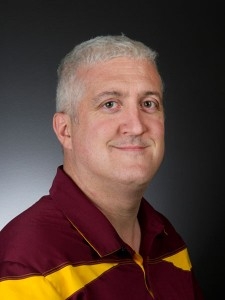Sep 19 2014
An award of $65,000 from Mayo Clinic in Arizona will help Arizona State University bioengineer Jeffrey La Belle continue development of a tear-based glucose meter designed to help people living with diabetes monitor their health.
The funding will enable La Belle’s research team to take the next step toward preparing for clinical trials of the device that can assess glucose levels by drawing tear fluid from the eyes. Current devices for measuring blood glucose levels require piercing the skin to draw blood samples.
 ASU bioengineer Jeffrey La Belle
ASU bioengineer Jeffrey La Belle
La Belle is an assistant professor in the School of Biological and Health Systems Engineering. He’s been working on the tear glucose sensor for more than three years in collaboration with Curtis Cook, chair of endocrinology at Mayo Clinic-Scottsdale, and Dharmendra Patel, the clinic’s chair of ophthalmology.
The tears sensor project began with support from a Mayo Clinic seed grant in 2011. BioAccel, an Arizona nonprofit that works to bring emerging biomedical technologies to the marketplace, is also supporting development of the tear glucose sensor.
Clinical trials are to be conducted at Mayo Clinic. The project team will seek additional support from the National Institutes of Health and industry to fund the trials.
“We have to make something we can ensure will be safe and effective outside the lab, and that is ready for a manufacturer,” La Belle said.
About 29 million people – more than 9 percent of the population – in the United States have diabetes, according to the American Diabetes Association. The disease is one of leading causes of death in the country.
Monitoring and managing blood glucose (or blood sugar) levels helps people with diabetes control the symptoms of the disease.
The tear sensor has been attracting interest from medical professionals and industry. Progress reports on development of the device have been published in four research journals, and La Belle has made about 25 conference presentations on the device.
He has provided research experience to more than 20 ASU engineering undergraduates and graduate students through their assistance with lab work related to the project.
Joe Kullman, [email protected]
(480) 965-8122
Ira A. Fulton Schools of Engineering